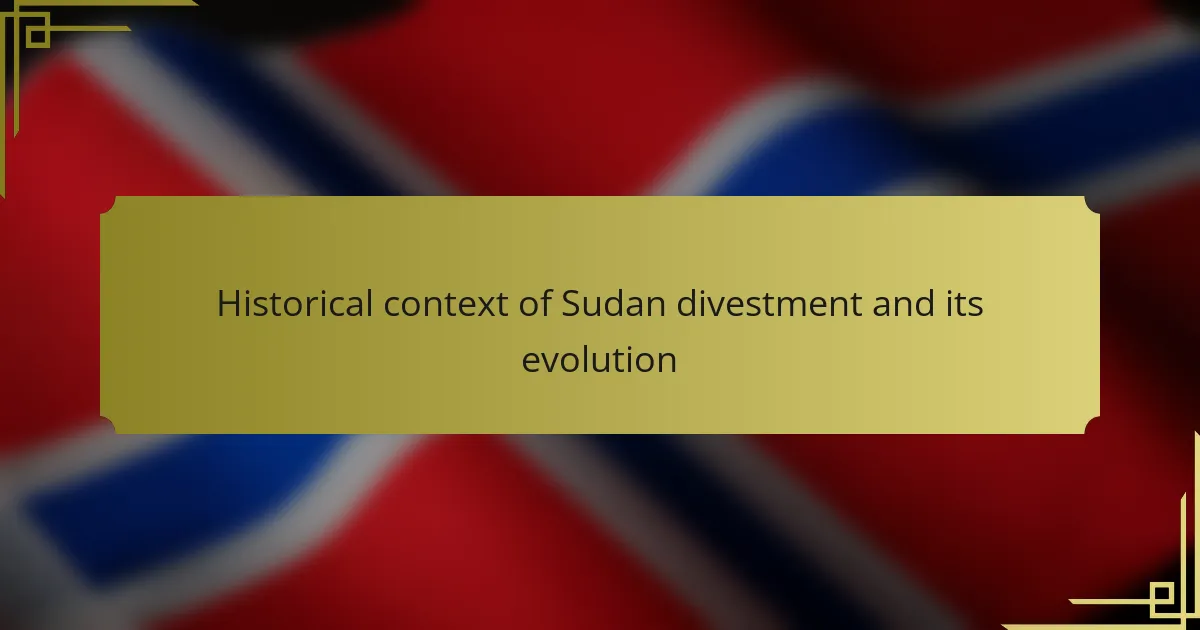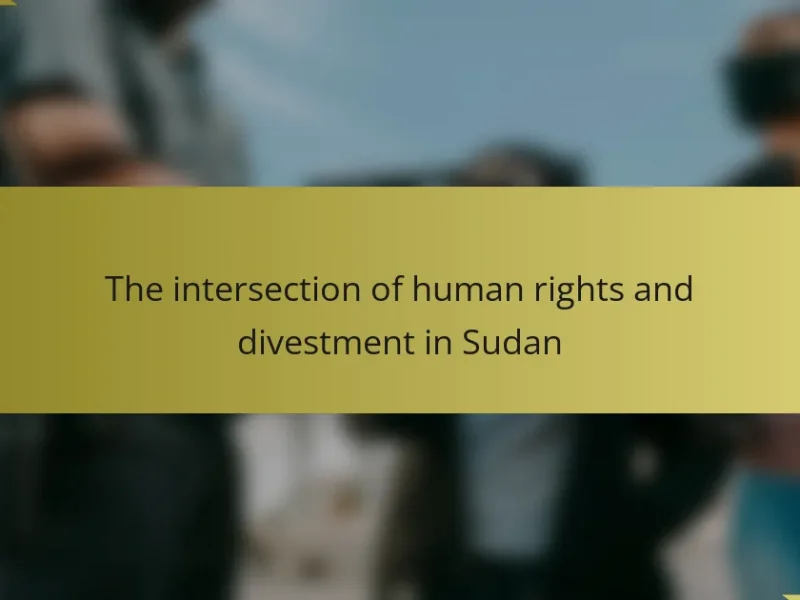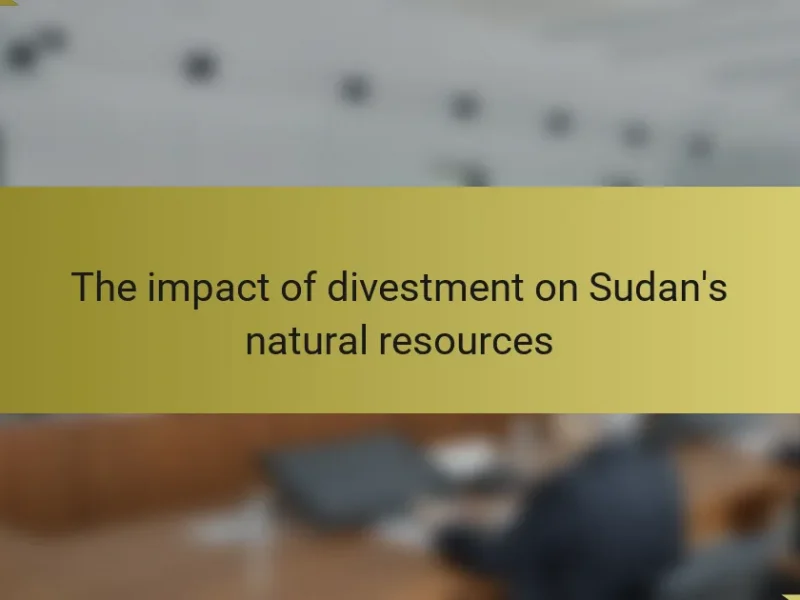Sudan divestment is the movement focused on withdrawing investments from companies operating in Sudan due to documented human rights violations, particularly during the Darfur conflict. The movement began gaining traction in the early 2000s, spearheaded by activists and organizations such as the Sudan Divestment Task Force, which aimed to apply financial pressure on the Sudanese government. Key milestones include the first U.S. state divestment law passed in Illinois in 2006 and the establishment of the Sudan Divestment Task Force in 2007, alongside the adoption of the Sudan Accountability and Divestment Act. As of 2023, various institutions continue to implement divestment policies, although challenges remain in enforcing these measures and ensuring compliance from companies operating in Sudan. The article will explore the historical context, evolution, and current state of Sudan divestment efforts.
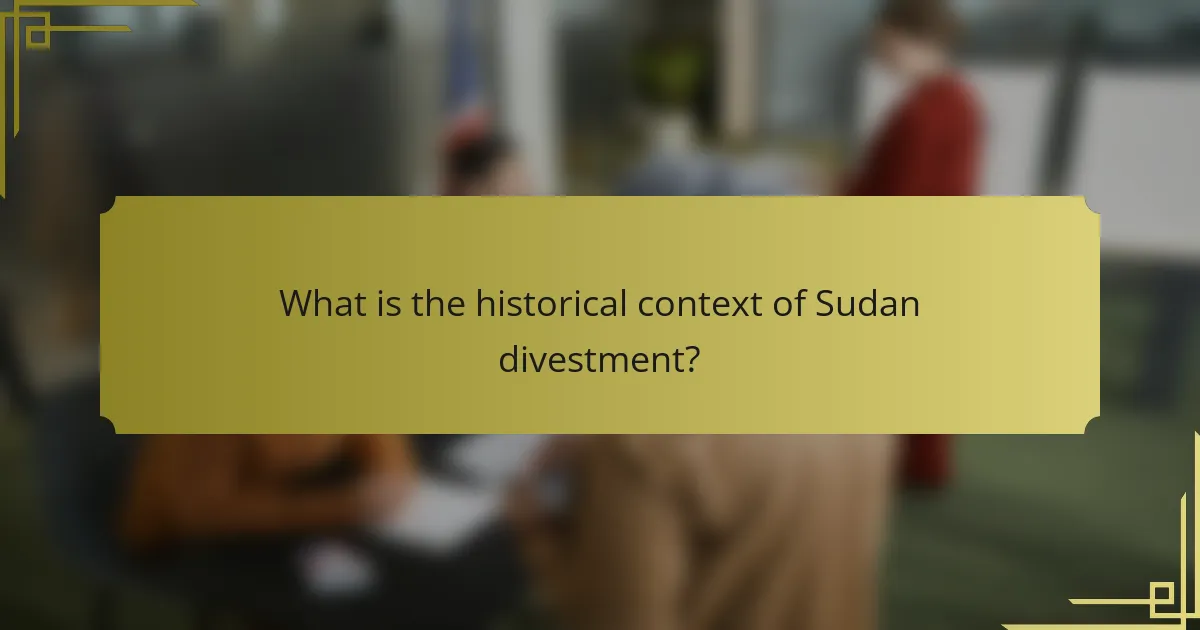
What is the historical context of Sudan divestment?
Sudan divestment refers to the movement aimed at withdrawing investments from companies operating in Sudan due to human rights violations. This movement gained momentum in the early 2000s amid the Darfur conflict, which saw widespread atrocities. Activists and organizations, like the Sudan Divestment Task Force, called for divestment as a means to pressure the Sudanese government. By 2006, several U.S. states and universities adopted divestment policies. Legislative measures, such as the Sudan Accountability and Divestment Act of 2007, further solidified this movement. The aim was to hold the Sudanese regime accountable for its actions while promoting ethical investment practices. The historical context is rooted in global human rights advocacy, reflecting a broader trend of socially responsible investing.
How did the divestment movement in Sudan begin?
The divestment movement in Sudan began in the early 2000s. Activists aimed to pressure the Sudanese government to end human rights abuses in Darfur. The movement gained momentum following reports of genocide and ethnic cleansing in the region. University students and organizations initiated campaigns to encourage institutions to withdraw investments from companies operating in Sudan. By 2005, numerous universities and pension funds had adopted divestment policies. The movement was supported by various human rights organizations, amplifying its reach and impact. Legislative efforts in the U.S. also contributed to the divestment push. These combined actions highlighted the international community’s response to the crisis in Sudan.
What were the key events leading to the initiation of divestment?
The key events leading to the initiation of divestment from Sudan include the Darfur conflict, which began in 2003. This conflict drew international attention due to widespread human rights abuses. In response, various advocacy groups mobilized to call for economic sanctions. The U.S. government imposed sanctions on Sudan in 2006. These sanctions targeted the Sudanese government and specific industries. In 2007, the divestment movement gained momentum with campaigns from organizations like Save Darfur. By 2010, several states had enacted laws requiring divestment from companies operating in Sudan. These actions were aimed at pressuring the Sudanese government to cease its violent practices. The culmination of these events led to a significant shift in investment policies regarding Sudan.
Who were the main actors involved in the early stages of divestment?
The main actors involved in the early stages of divestment from Sudan included advocacy groups, universities, and state governments. Advocacy groups, such as the Sudan Divestment Task Force, played a critical role in raising awareness about the humanitarian crisis in Sudan. These organizations mobilized public opinion and pressured institutions to withdraw investments. Universities, like Harvard and Stanford, began to adopt divestment policies in response to calls from students and activists. State governments, including Illinois and California, also enacted divestment legislation targeting companies operating in Sudan. These collective efforts aimed to leverage economic pressure to influence the Sudanese government’s actions during the Darfur conflict.
What factors contributed to the evolution of Sudan divestment?
The evolution of Sudan divestment was influenced by several key factors. International awareness of human rights abuses in Sudan played a significant role. Reports of genocide in Darfur prompted global condemnation and activism. Economic sanctions imposed by the U.S. government further pressured companies to withdraw investments. Public campaigns by organizations like Save Darfur raised awareness and mobilized support for divestment. Legislative actions, such as the Sudan Accountability and Divestment Act of 2007, formalized the divestment process. Institutional investors and pension funds began to adopt divestment policies in response to ethical concerns. The combination of activism, legislation, and economic pressure created a strong impetus for divestment from Sudan.
How did international relations impact Sudan divestment strategies?
International relations significantly influenced Sudan divestment strategies. The imposition of economic sanctions by Western nations, particularly the United States, pressured companies to withdraw investments. This was largely due to Sudan’s involvement in human rights violations and conflicts, which drew international condemnation. As a result, many investors sought to distance themselves from the perceived risks associated with Sudan. Furthermore, diplomatic relations with countries like China led to increased investments from non-Western entities. This shift altered the landscape of divestment, as some nations continued to engage with Sudan despite international pressure. The interplay of these factors shaped the overall divestment strategies in response to changing international relations.
What role did economic conditions play in the divestment process?
Economic conditions significantly influenced the divestment process in Sudan. Economic instability and declining oil revenues prompted international investors to reevaluate their positions. The deteriorating financial environment increased the risks associated with investments in Sudan. As a result, many companies chose to divest to protect their assets. Additionally, global economic trends, such as fluctuating oil prices, further impacted the divestment decisions. Economic sanctions imposed by various countries also accelerated the withdrawal of foreign investments. These economic factors collectively shaped the landscape of divestment in Sudan.
Why is understanding the evolution of Sudan divestment important?
Understanding the evolution of Sudan divestment is important because it highlights the impact of economic pressure on governmental policies. Over the years, divestment campaigns have aimed to address human rights violations and promote social justice in Sudan. These efforts have influenced international relations and corporate behavior regarding investments in Sudan. For instance, the divestment movement gained momentum in the early 2000s, coinciding with the Darfur conflict. This led to significant financial repercussions for companies operating in the region. Furthermore, understanding this evolution provides insights into the effectiveness of grassroots activism and policy changes. It also sheds light on the complexities of global economic systems and their role in humanitarian issues.
What lessons can be learned from the Sudan divestment experience?
The Sudan divestment experience teaches the importance of targeted economic pressure in promoting social change. Divestment campaigns can effectively draw attention to human rights abuses. They mobilize public opinion and influence corporate behavior. For instance, divestment from companies operating in Sudan aimed to protest the Darfur genocide. The movement saw universities and pension funds withdrawing investments, highlighting ethical investing. This strategy demonstrated that financial leverage could complement diplomatic efforts. Additionally, it underscored the need for sustained advocacy to maintain momentum. Lastly, the experience revealed the challenges of coordinating efforts across various stakeholders.
How does Sudan divestment influence current global divestment trends?
Sudan divestment significantly influences current global divestment trends by serving as a model for socially responsible investment practices. The divestment movement against Sudan began in the early 2000s due to humanitarian concerns regarding the Darfur conflict. This movement highlighted the power of collective action in influencing corporate behavior and government policies.
As a result, many investors and institutions adopted similar divestment strategies focused on ethical considerations. The success of Sudan divestment has encouraged other movements targeting fossil fuels, tobacco, and conflict minerals. For instance, the global fossil fuel divestment campaign, which gained momentum in the 2010s, draws inspiration from the Sudan divestment framework.
This trend is evidenced by the increase in the number of universities and pension funds committing to divest from harmful industries. According to a report by the Divest-Invest Coalition, assets under management in fossil fuel divestment reached over $14 trillion by 2021. Sudan divestment thus acts as a catalyst for a broader shift towards sustainable investment practices worldwide.
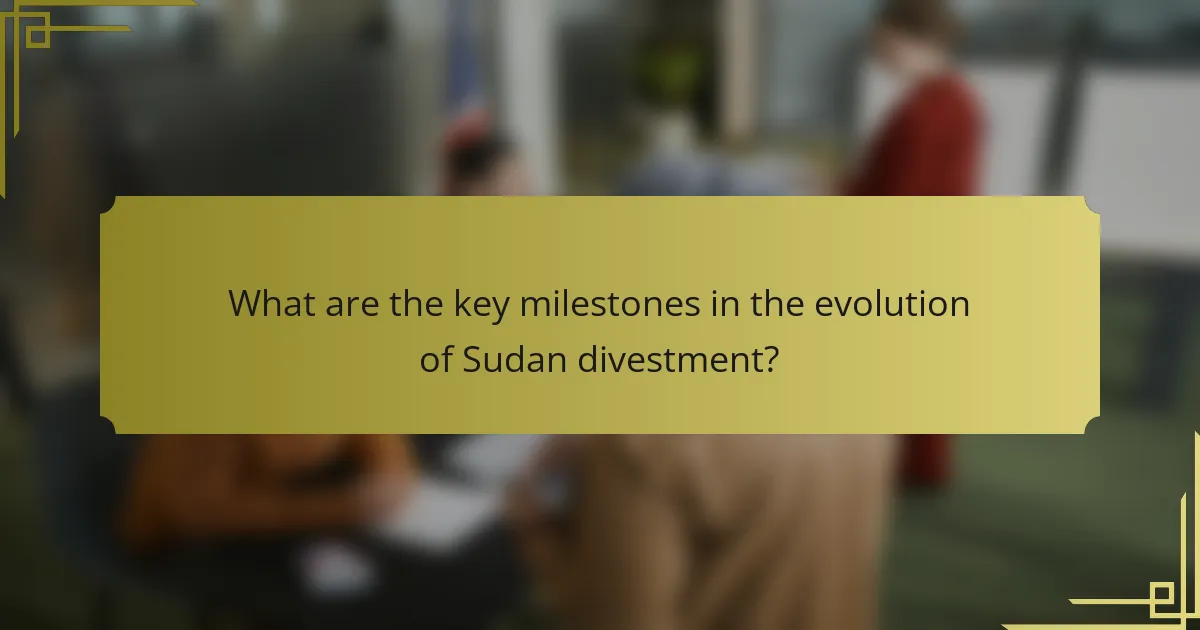
What are the key milestones in the evolution of Sudan divestment?
Key milestones in the evolution of Sudan divestment include the early 2000s when activists began advocating for divestment from Sudan due to the Darfur conflict. In 2006, the State of Illinois became the first U.S. state to pass a divestment law targeting Sudanese companies. By 2007, the Sudan Divestment Task Force was established to guide institutional investors in divesting from Sudan. In 2008, the United Nations adopted Resolution 1769, calling for increased pressure on the Sudanese government. In 2010, several universities and pension funds announced their divestment from Sudan. By 2017, the U.S. government lifted some sanctions, impacting divestment strategies. These milestones reflect a growing movement aimed at holding the Sudanese government accountable for human rights violations.
What major legislative actions have been taken regarding Sudan divestment?
Major legislative actions regarding Sudan divestment include the Sudan Accountability and Divestment Act of 2007. This act aimed to impose sanctions on the Sudanese government due to its involvement in the Darfur conflict. It encouraged U.S. states and companies to divest from businesses operating in Sudan.
Additionally, several U.S. states enacted their own divestment laws following this federal legislation. These state laws targeted investments in companies that contributed to the Sudanese government’s revenue.
The legislative actions were motivated by human rights concerns and the humanitarian crisis in Sudan. They aimed to pressure the Sudanese government to cease its violent actions against civilians.
What were the implications of the Sudan Accountability and Divestment Act?
The Sudan Accountability and Divestment Act aimed to hold the Sudanese government accountable for human rights violations. It authorized states and entities to divest from companies operating in Sudan. This act influenced financial markets by prompting widespread divestment efforts. Many investors withdrew funds from companies linked to the Sudanese government. The act also raised awareness about the humanitarian crisis in Sudan. It encouraged activism and advocacy for human rights. Additionally, it set a precedent for future divestment legislation targeting oppressive regimes. Overall, the act had significant implications for both economic and political pressures on Sudan.
How have state-level divestment initiatives shaped national policy?
State-level divestment initiatives have significantly influenced national policy by raising awareness and prompting legislative action. These initiatives often target companies involved in activities that conflict with human rights standards. For instance, states like California and New York have divested from companies linked to the Sudanese government. This local action creates a ripple effect, encouraging federal policymakers to address the issue more aggressively.
As these state-level actions gain media attention, they mobilize public opinion against complicity in human rights abuses. Consequently, national policies have evolved to reflect this growing consensus. The U.S. government has implemented sanctions and introduced legislation aimed at curbing investments in Sudan. The cumulative effect of these state initiatives has led to a more unified national stance against entities that violate human rights.
How has public opinion influenced the divestment movement in Sudan?
Public opinion has significantly influenced the divestment movement in Sudan. Activism and advocacy groups have mobilized public sentiment against the Sudanese government. High-profile campaigns highlighted human rights abuses in Darfur. These campaigns garnered media attention and increased awareness globally. As public outrage grew, investors faced pressure to divest from companies operating in Sudan. This led to legislative efforts in various countries to encourage divestment. For example, the U.S. passed the Sudan Accountability and Divestment Act in 2007. Overall, public opinion catalyzed a broader movement to withdraw financial support from Sudan.
What role did activism play in raising awareness about Sudan divestment?
Activism played a crucial role in raising awareness about Sudan divestment. Grassroots movements mobilized public support against the Sudanese government’s actions in Darfur. Organizations like the Sudan Divestment Task Force campaigned for universities and pension funds to withdraw investments. These efforts highlighted the ethical implications of financial ties to Sudan. Public demonstrations and advocacy increased media coverage of the issue. As a result, several states enacted divestment laws. By 2007, over 70 institutions had committed to divesting from Sudan. Activism transformed Sudan divestment into a significant social justice issue.
How did social media impact the mobilization for divestment?
Social media significantly enhanced the mobilization for divestment. It provided a platform for activists to share information rapidly. Campaigns gained visibility through hashtags and viral content. Social media facilitated connections among like-minded individuals and organizations. This led to coordinated efforts and increased participation in protests. Online petitions and calls to action reached a broader audience. Data shows that social media engagement correlates with higher divestment success rates. The ability to disseminate real-time updates kept momentum alive during campaigns.
What challenges have arisen during the evolution of Sudan divestment?
Challenges during the evolution of Sudan divestment include political resistance, economic implications, and ethical dilemmas. Political resistance arises from the Sudanese government, which may retaliate against divestment efforts. Economic implications include potential losses for investors and companies withdrawing from Sudan. Ethical dilemmas involve balancing financial interests with human rights concerns. Additionally, lack of transparency in Sudan’s financial systems complicates divestment efforts. International cooperation is often inconsistent, leading to fragmented actions against the Sudanese regime. These challenges have hindered the effectiveness of divestment strategies aimed at promoting change in Sudan.
What obstacles have divestment advocates faced over the years?
Divestment advocates have faced significant obstacles over the years. One major challenge is resistance from powerful stakeholders. These stakeholders often prioritize financial returns over ethical considerations. Additionally, divestment advocates encounter political pushback. Governments and corporations may oppose divestment due to economic interests.
Another obstacle is public awareness and engagement. Many individuals remain uninformed about the impact of investments in Sudan. This lack of awareness hampers advocacy efforts. Furthermore, there is often a lack of coordinated strategy among various advocacy groups. This disunity can dilute the effectiveness of campaigns.
Legal barriers also pose challenges. Some institutions face restrictions on divesting from certain sectors. Finally, advocates struggle against misinformation. Misconceptions about divestment’s effectiveness can undermine support. These obstacles collectively hinder the progress of divestment initiatives aimed at addressing issues in Sudan.
How have geopolitical changes affected the divestment landscape?
Geopolitical changes have significantly influenced the divestment landscape. For instance, shifts in political power can lead to increased scrutiny of investments in certain regions. The rise of human rights awareness has prompted companies to reconsider their ties with nations facing sanctions. Additionally, conflicts and instability often trigger divestment from affected areas. The Sudan divestment movement exemplifies this, as international pressure has led to reduced investments in the country. Furthermore, changing alliances among nations can alter investment strategies. For example, the U.S. sanctions on Sudan impacted foreign investment decisions. Overall, geopolitical dynamics shape the motivations and actions behind divestment strategies.
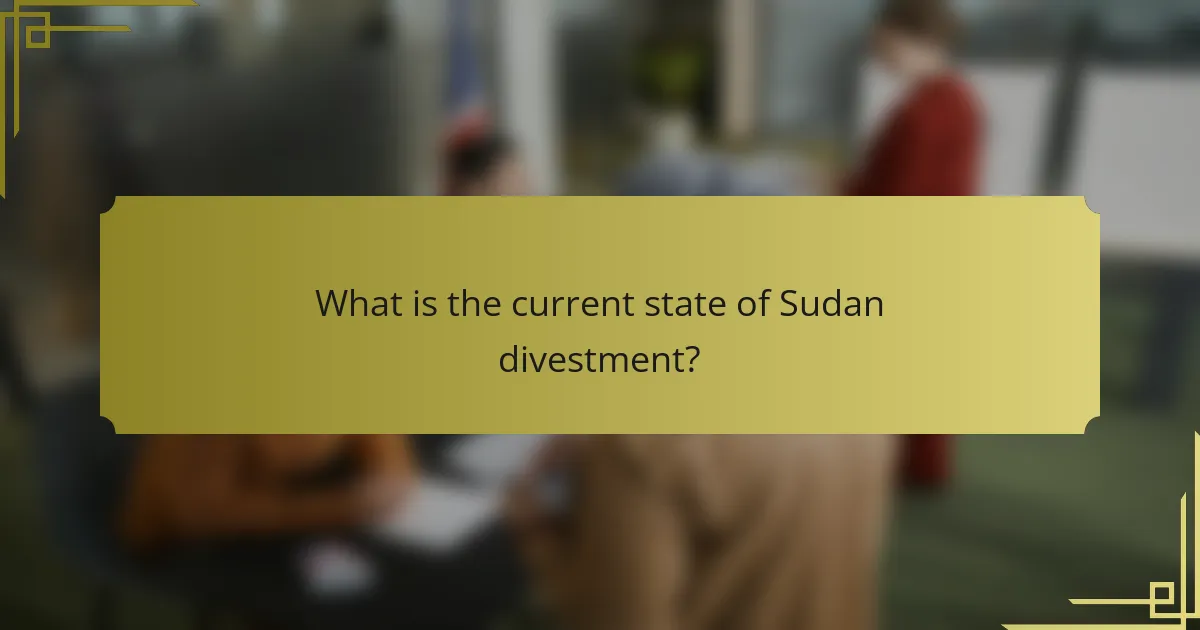
What is the current state of Sudan divestment?
The current state of Sudan divestment involves ongoing efforts by various organizations and governments to withdraw investments from Sudan due to human rights violations. Many institutions have implemented divestment policies targeting companies operating in Sudan. This movement gained momentum following the Darfur conflict, which prompted widespread condemnation. As of 2023, several states in the U.S. maintain divestment laws related to Sudan. Reports indicate that divestment efforts have led to significant financial pressure on the Sudanese government. However, challenges remain in fully enforcing these policies. Some companies continue to operate in Sudan despite the divestment movement. Overall, the situation reflects a complex interplay of ethical investment practices and geopolitical considerations.
What are the recent developments in Sudan divestment efforts?
Recent developments in Sudan divestment efforts include increased pressure from international organizations. These organizations are advocating for financial institutions to withdraw investments linked to human rights violations. Notably, the United Nations has highlighted concerns regarding the ongoing conflict and humanitarian crisis in Sudan. In 2023, several major banks announced plans to divest from companies operating in Sudan. This decision aligns with global trends towards ethical investing and corporate responsibility. Additionally, advocacy groups have launched campaigns to raise awareness about the situation in Sudan. These campaigns aim to mobilize public support for divestment initiatives. The overall momentum reflects a growing recognition of the need for economic measures to influence political change in Sudan.
How have recent political changes in Sudan impacted divestment strategies?
Recent political changes in Sudan have significantly influenced divestment strategies. The military coup in October 2021 led to increased instability and uncertainty. This prompted many investors to reassess their positions in Sudan. Companies and funds have begun to withdraw investments due to concerns over human rights violations and governance issues. The U.S. government has also imposed sanctions, further discouraging investment. Additionally, international organizations have called for responsible investment practices in light of the political climate. These factors collectively contribute to a trend of heightened divestment from Sudan.
What organizations are currently leading the divestment initiatives?
Organizations currently leading divestment initiatives include the Sudan Divestment Task Force and the Global Divestment Movement. The Sudan Divestment Task Force focuses on mobilizing investors to withdraw from companies operating in Sudan. This organization has been influential in raising awareness about the humanitarian situation in Sudan. The Global Divestment Movement aims to promote divestment from fossil fuels and other harmful industries. It has gained traction globally, encouraging institutions to reconsider their investment strategies. Both organizations provide resources and support to facilitate divestment efforts. Their initiatives are backed by evidence of the negative impacts of investments in conflict regions.
How do stakeholders perceive the future of Sudan divestment?
Stakeholders perceive the future of Sudan divestment with caution and concern. Many investors are wary due to ongoing political instability and human rights issues in Sudan. Research shows that divestment efforts have been influenced by international sanctions and advocacy from human rights organizations. Stakeholders recognize that effective divestment could pressure the Sudanese government to improve its policies. However, they also acknowledge the risk of economic repercussions for the local population. The perception is shaped by both ethical considerations and financial implications. Stakeholders are advocating for a balanced approach that promotes both divestment and sustainable development.
What predictions can be made about the continuation of divestment efforts?
Predictions about the continuation of divestment efforts indicate a likely increase in activity. Growing global awareness of social and environmental issues drives this trend. Many investors are prioritizing ethical considerations in their portfolios. Historical movements against oppressive regimes suggest sustained pressure will continue. For instance, divestment campaigns have successfully influenced policies in South Africa and Sudan. Increased participation from institutional investors is expected as public sentiment shifts. Furthermore, regulatory frameworks may evolve to support divestment initiatives. These factors collectively suggest that divestment efforts will persist and potentially expand in scope.
How might global economic trends influence Sudan divestment in the coming years?
Global economic trends may significantly influence Sudan divestment in the coming years. As international markets fluctuate, investors often reassess risk factors associated with Sudan. Economic instability in global markets can lead to increased divestment from regions perceived as high-risk. Additionally, shifts towards sustainable and ethical investing are gaining traction. This trend may prompt investors to withdraw from Sudan due to human rights concerns. The rise of global sanctions against countries with poor governance can also affect investment decisions. For instance, past sanctions on Sudan have led to decreased foreign direct investment. Overall, these economic trends create a complex landscape for Sudan’s investment environment.
What best practices can be adopted for effective divestment strategies?
Effective divestment strategies should prioritize clear objectives and stakeholder engagement. Establishing specific goals helps define the focus of divestment efforts. Engaging stakeholders ensures transparency and builds trust in the process. Conducting thorough research on the targeted entities is essential. This research should evaluate financial, ethical, and social implications. Implementing a phased approach allows for gradual divestment, reducing market disruption. Monitoring and assessing the impact of divestment decisions is crucial for ongoing effectiveness. Lastly, documenting and communicating the rationale behind divestment fosters accountability and supports future strategies.
What lessons from Sudan divestment can be applied to other contexts?
Sudan divestment teaches that targeted financial pressure can influence political change. This approach was effective in mobilizing public opinion and institutional investors. Divestment campaigns can raise awareness of human rights abuses. They can also encourage corporations to reconsider their involvement in oppressive regimes. Additionally, coalition-building among activists, investors, and policymakers enhances impact. This strategy can be replicated in other contexts where ethical concerns are at stake. Historical examples, such as the anti-apartheid movement, demonstrate similar principles. These lessons highlight the power of collective action and ethical investment.
How can stakeholders collaborate to enhance the effectiveness of divestment initiatives?
Stakeholders can collaborate to enhance the effectiveness of divestment initiatives by sharing resources and information. This collaboration can include joint research efforts to identify key areas for divestment. Stakeholders can also develop unified communication strategies to raise public awareness. Engaging in collective advocacy can strengthen their influence on policymakers. Additionally, pooling financial resources may allow for larger-scale divestment actions. Coordinated efforts can lead to more significant impacts on targeted industries. Collaborative platforms can facilitate ongoing dialogue and strategy adjustments. Evidence shows that collaborative divestment efforts have historically led to more substantial economic pressure on targeted entities.
The main entity of the article is Sudan divestment, which refers to the movement aimed at withdrawing investments from companies operating in Sudan due to human rights violations. The article outlines the historical context of this movement, tracing its origins to the early 2000s amid the Darfur conflict, and highlights key events, actors, and legislative actions that shaped its evolution. It discusses the influence of international relations, economic conditions, and public opinion on divestment strategies, as well as the challenges faced by advocates. Additionally, the article examines the implications of Sudan divestment for current global trends in socially responsible investing and offers insights into best practices for effective divestment initiatives.
